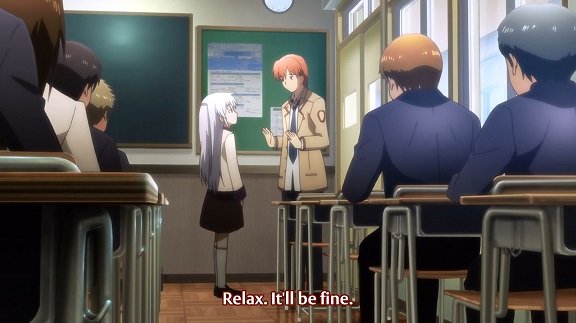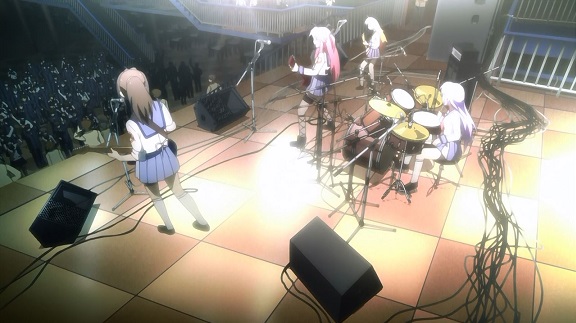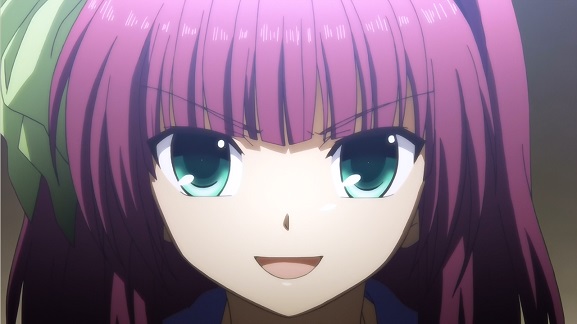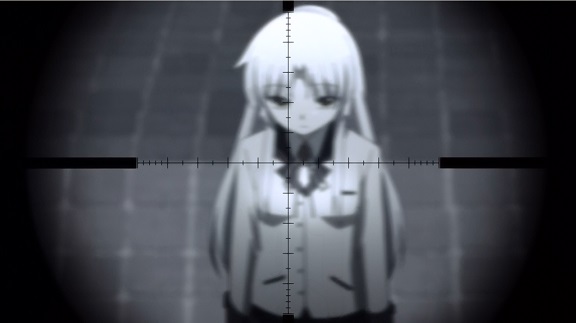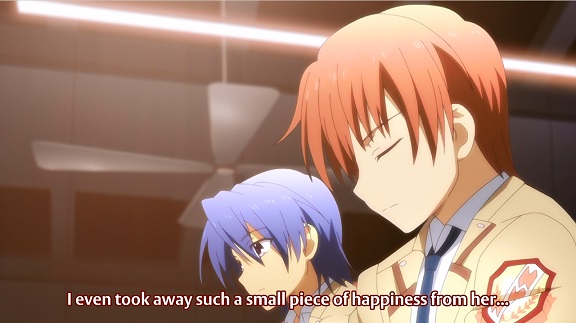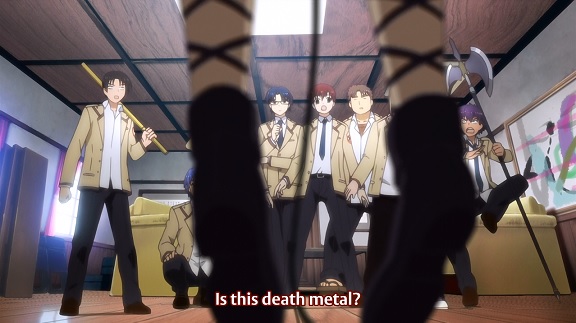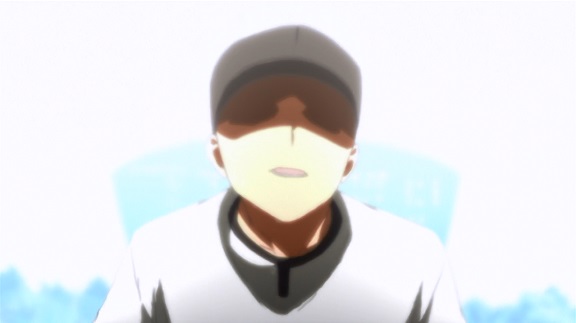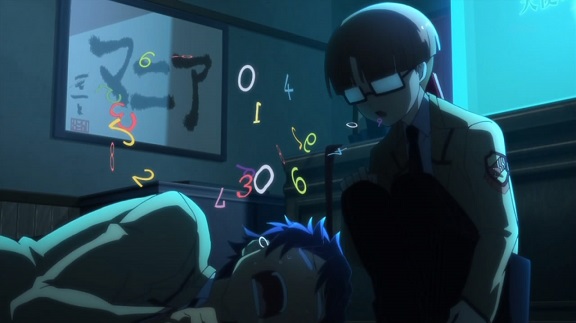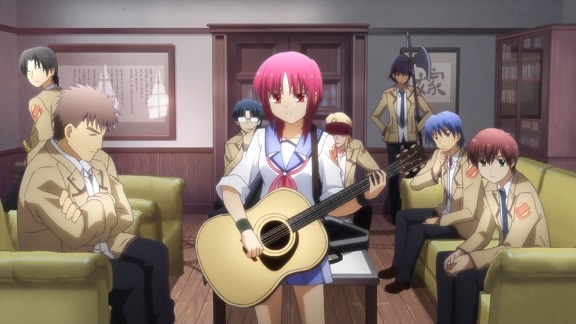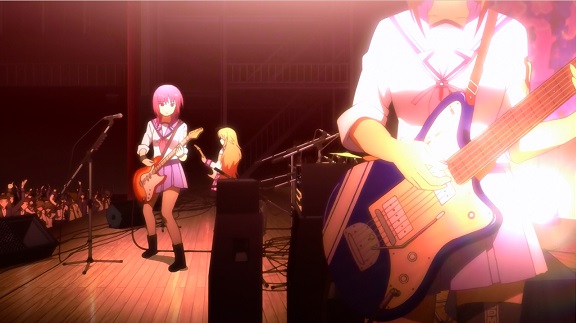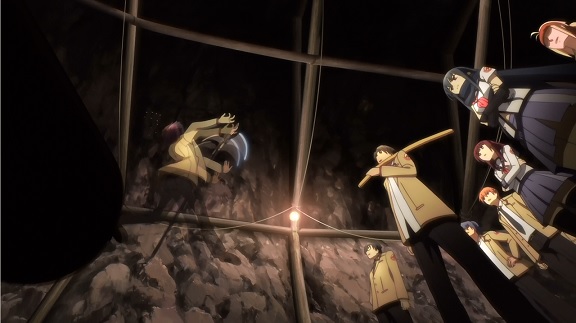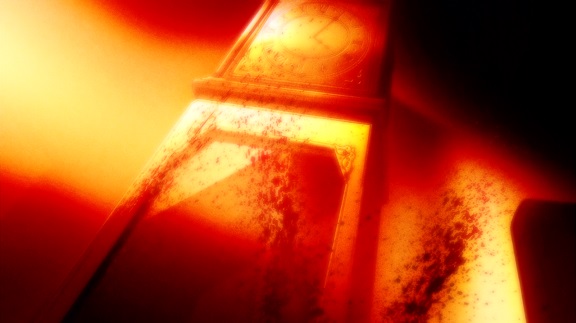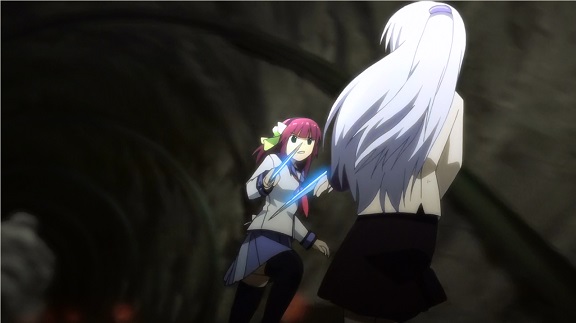If you’re the type of person who likes to ration out their sweets, to prolong the pleasure of knowing you have them, you will understand why I still haven’t finished K-On! Season II. Only ten more episodes, one special, the movie and then I’d be done with K-On and I don’t want to be done with it quite yet. The biggest, most influential title of 2010, its influence still felt almost a decade later. I wasn’t there for all the fan blather and mass hysteria about the Rise of Moe blobs, but K-On is what made Cute Girls Doing Cute Things/Slice of Moe anime respectable and I wouldn’t want it any other way. I don’t want to talk too much about it though as y’all will have made up your opinion about it anyway.
Rather, let’s talk about lesser known titles that ran in 2010. Sora no Woto was one of A-1’s earliest productions and one of its early gems. Revolving around a small squad of female soldiers guarding the borders of Helvetia in a world in which the apocalypse has already happened, but life goes on for as long as it can. The setting is rural and idyllic but in the back of everybody’s mind is the fact that humanity has declined and this is the end. Most of it is pure slice of life though as we follow our protagonist as she tries to fit in with her new squad and become a trumpetist.Don’t expect answers. This is one for those who like Haibane Renmei, or 2017’s Shoujo Shuumatsu Ryokou/Girl’s Last Tour. There’s a wistful, nostalgic feeling underscoring the series and if you like that sort of thing this is one to watch out for.
Looking at 2010 as a whole, if K-On heralds the future, anime’s dead past is represented by the slew of old fashioned harem, ecchi and other fan service series. There’s no isekai in sight, but quite a few titles in which some ordinary teenage dirt bag either gathers a battle harem or turns out to be the most powerful boy in the world. Hyakka Ryouran Samurai Girls, Sekirei: Pure Engagement, Sora no Otoshimono, Omamori Himari, Seikon No Qwaser, Ichiban Ushiro no Daimaou, Sora no Otoshimono. All are more or less terrible, but all were poular once. Add in things like Queen’s Blade or Koihime†Musou, where the audience standin has been done away with entirely and you have a wish fulfilment subgenre that easily had fifteen or so shows this year, almost as omnipresent as isekai wish fulfilment is these days. Perhaps the best of these series, breast phsyics be damned, was High School of the Dead, let’s survive the zombie apocalypse with my harem of high school girls, nurses and that one fat classmate who is scarily good at improvising weaponry.
Baseball is a given in sports anime and there were at least two typical, earnest series this year, with new seasons of Ookiku Furikabutte and Major, neither of which I’ve actually watched. Instead the sports title of 2010 I’d like to recommend is Giant Killing. Football (soccer), not baseball and professional, not high school tournaments. East Tokyo United is a football team struggling to avoid relegation. Time for a new manager and who better than a former wunderkid who abandoned the team when they needed his talents the most? Well, he did prove his worth in the lower rungs of English football as a coach and if you can make it there, a scrappy relegation battle should be no problem. If you play Football Manager this is the anime for you.
Two little videos dropped in early August that quietly established major franchises. First on August 10, Sunrise released Mokei Senshi Gunpla Builders Beginning G, a oneshot about kids learning to build Gundam modesl and have fun with it. A few years later this would’ve evolved into the Gundam Build series, where young boys and the occasional girl would build Gundam models and then use them to fight in VR. In general for mecha like most years this decade, the pickings were slim. The big title this time was Star Driver, which I saw two years ago but can’t remember much about. Other than that there was gundam Unicorn, which I still need to see.
But the more important video launched three days later, Love Live‘s first single, Bokura no Live Kimi to no Life. Funnily enough, the original anime video for this was also done by Sunrise. No, they don’t do just mecha. It’s a fun little video but you can’t find it anywhere unless you want to sail the seven seas. But the live version by the actual voice actresses is good too. Love Live would be hyuuge in a few years, but for the moment you had to make do with this as well as what’s probably μ’s best song, Snow Halation which came out just before Christmas.
The title of the year for me is Angel Beats!, of which I’ve written before. It’s a messy, over-ambitious series that was intended to be a 2-cour series of twentyfour or twentysix episodes but in the end only got half. Written by Maeda Jun, who has a habit of trying to elevate his stories with psychobabble and pretentious philosophical musings, yet this hit me right in the feels nonetheless. I watched this one hot august night on holiday in the South of France with the family in 2013, not even two years after Sandra had died. angel Beats ultimately is about grief and coming to terms with death. It was just what I needed. Some of the songs in it, like this one, still make me cry hearing them today.
Good series I didn’t watch: shiki, Durarara, Kuragehime, Arakawa Under the Bridge, Nodame Cantabile Finale, Tatami Galaxy. Harem incest trash I did see from this year: Oreimo, which would’ve been a great little series about a teenage wastrel finally bonding with his younger sister, but which instead revitalised the little sister subgenre for the 2010s. And that after KissxSis tried to kill it off through pure boredom. But really, if you need to watch any little sister anime, make it Yosuga no Sora, in which they actually do fuck in the end. Otherwise, the best harem/romcom wish fulfilment fantasy series this year was Kami nomi zo Shiru Sekai/The World God Only Knows, in which the protagonist has to help an angel heal the hearts of girls using his godlike romance game skills…
What else is there? Heartcatch Pretty Cure is many people’s best Precure series. Black Lagoon got a new OVA in 2010. Tamayura, a neat slice of moe series about a teenage girl moving back to the city of her father a few years after he died, debuted this year. It’s another series that makes me gently choke up sometimes. Amagami SS was a dating sim adaptation that wasn’t terrible and distinguished itself by not going the harem route, but rather by doing a story for each heroine. When I first watched it I was obsessed by it for a little while but I haven’t managed to finish the sequel yet. Hidamari Sketch had another outing, as did A Certain Magical Index and Yozakura Quartet. Index was a mess, Yozakura Quartet was fun and Hidamari Sketch is another series I don’t want to finish. We’ve barely scratched the surface of what 2010 has to offer: I got 129 series registrered on MAL broadcast this year and I’ve watched 56 of them. I haven’t even mentioned Panty and Stocking yet, Gainax’s last hurrah before all the interesting talent went and founded Trigger.
2010: a busy year. A good year? I’m not sure. Plenty of cult classics and solid entertaining shows this year, one or two true essentials (but none I’d watched) but nothing that stands out on the level of an Evangelion or a Gurren Lagann. K-On is the biggest series this year, but it debuted earlier even if the second season is so much better. In all, you can see some signs of what anime would evolve into over this decade, but hindsight is twenty twenty. Had I written this review in December 2010, I’m sure I would’ve emphasised different series as important, let alone that I’d know about something like Love Live
This is day two of Twelve Days of Anime 2019. Tomorrow: 2011 and a certain magical girl show setting the world on fire enough I heard about it.

